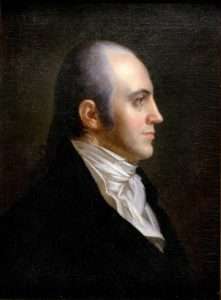The Volokh Conspiracy
Mostly law professors | Sometimes contrarian | Often libertarian | Always independent
Today in Supreme Court History: May 22, 1807
5/22/1807: Aaron Burr is indicted on charges of treason. Chief Justice John Marshall would preside over Burr's trial.

Editor's Note: We invite comments and request that they be civil and on-topic. We do not moderate or assume any responsibility for comments, which are owned by the readers who post them. Comments do not represent the views of Reason.com or Reason Foundation. We reserve the right to delete any comment for any reason at any time. Comments may only be edited within 5 minutes of posting. Report abuses.
Please to post comments


TC Heartland LLC v. Kraft Foods Group, 581 U.S. 258 (decided May 22, 2017): patent suit must be brought in defendant’s state of incorporation under patent venue statute (28 U.S.C. §1400(b)) despite later revision of general venue statute (§1391) with broader language
Cooper v. Harris, 581 U.S. 285 (decided May 22, 2017): deferring to District Court’s factual determination rejecting North Carolina’s redistricting because no reason was shown for increasing percentage of black voters in two districts; plaintiffs (registered voters) not collaterally estopped by State’s victory in racial gerrymandering suit brought by civil rights groups
Water Splash, Inc. v. Menon, 581 U.S. 271 (decided May 22, 2017): Hague Service Convention (to which the U.S. is a signatory) allows service of suit abroad by mail (suit was by water park against Canadian employee for giving design drawings to competitor)
Wilson v. Arkansas, 514 U.S. 927 (decided May 22, 1995): police did not have to knock first when entering house with a warrant (front door was open; evidence properly admitted that police found defendant flushing drugs down the toilet)
Brigham City v. Stuart, 547 U.S. 398 (decided May 22, 2006): police responding to a disturbance did not need a warrant to enter house after they saw through a screen door one person punch another, causing spitting blood, and after they knocked first though their knocking was not heard
Jones v. United States, 529 U.S. 848 (decided May 22, 2000): private residence not used in interstate commerce; federal arson statute doesn’t apply
Bankers Trust Co. v. Texas & P.R. Co., 241 U.S. 295 (decided May 22, 1916): mere fact that defendant was corporation chartered by Congress does not mean that any lawsuit against it contains federal issue invoking federal court jurisdiction
United States v. Playboy Entertainment Group, 529 U.S. 803 (decided May 22, 2000): striking down on First Amendment grounds cable providers’ prevention of “signal bleed” by either scrambling sexually explicit channels or restricting viewing to certain hours; less restrictive alternatives available (in the 1980’s those of us without cable would watch those rhythmic wiggles on our TVs and try to guess what those people were doing) (though the Playboy Channel was concededly “sexually explicit” under the statute, Hefner & Co. were careful to avoid depicting actual sex; Teri Weigel, the April 1986 Playmate, went into porn and they never spoke to her again)
Zicarelli v. New Jersey State Comm’n of Investigation, 406 U.S. 472 (decided May 22, 1972): witness in organized crime investigation could not “take the Fifth” after commission had granted him “use and derivative use” immunity
United States Term Limits v. Thornton, 514 U.S. 779 (decided May 22, 1995): States cannot impose term limits on people they send to Congress
captc, in Wilson v. Arkansas, it looks like you have that backwards and in an unanimous decision, the Court ruled that the police indeed did need to 'knock and announce.'
"Justice Thomas delivered the opinion of the Court.
The Arkansas Supreme Court affirmed petitioner's conviction on appeal. 317 Ark. 548, 878 S. W. 2d 755 (1994). The court noted that "the officers entered the home while they were identifying themselves," but it rejected petitioner's argument that "the Fourth Amendment requires officers to knock and announce prior to entering the residence." Id., at 553, 878 S. W. 2d, at 758 (emphasis added). Finding "no authority for [petitioner's] theory that the knock and announce principle is required by the Fourth Amendment," the court concluded that neither Arkansas law nor the Fourth Amendment required suppression of the evidence. Ibid.
We granted certiorari to resolve the conflict among the lower courts as to whether the common law knock and announce principle forms a part of the Fourth Amendment reasonableness inquiry. [n.1] 513 U. S. ___ (1995). We hold that it does, and accordingly reverse and remand."
https://www.law.cornell.edu/supct/html/94-5707.ZO.html
Thanks! Will correct this.
Thomas left open the question of whether knocking and announcing is always necessary in a warrantless situation (the Court’s later decisions, some of which I’ve commented on, describe situations where it isn’t) and remanded the question as to whether it was necessary in this case.
The more salient point is that SCOTUS ruled in Hudson v. Michigan that the exclusionary rule does not apply to violations of knock-and-announce. So the only remedy if police do violate it is a § 1983 suit. (Well, there could be state law remedies as well.) And it's unlikely that there will be much in the way of a damages award for that under ordinary circumstances.
yes, decided in 2006
thanks
Zicarelli v. New Jersey State Comm’n of Investigation, 406 U.S. 472 (decided May 22, 1972): witness in organized crime investigation could not “take the Fifth” after commission had granted him “use and derivative use” immunity
Curious as to when the practice of granting immunity to compel testimony came into being.